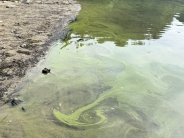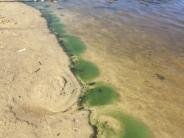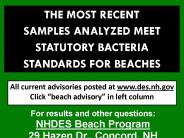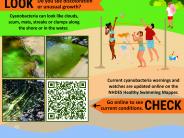Robinson Pond Water Advisories
The water quality at Robinson Pond is tested through the NHDES Beach Inspection Program during the months of June, July and August.
This program monitors public beaches for the presence of fecal bacteria. A beach advisory is issued when a water sample contains fecal bacteria levels that exceed the state standard, indicating unhealthy swimming conditions.
This page will be updated if an advisory has been posted.
► Advisory Signs
Depending on the results of the water quality last tested, one of the following three signs will be posted during the water testing season to inform visitors of the water condition.
GREEN - Monitored
- The most recent samples analyzed meet statutory bacteria standards for beaches.
YELLOW - Bacteria Advisory
- High levels of BACTERIA have been detected in the WATER. Water currently not suitable for wading or swimming.
CYANOBACTERIA BLOOM FLYER
Information regarding cyanobacteria blooms. Note, do not wade, swim or let pets in the water near the suspected bloom.
Signs are posted at the following areas within Robinson Pond:
- Main Gate
- Boat Launch
- On the Beach
Images of each sign can be found in the slideshow below.
►Cyanobacteria Harmful Algal Blooms
Harmful algal blooms are the rapid growth of algae or cyanobacteria in water that can harm people, animals or the environment.
Learn more about how to identify and report Harmful Algal Blooms by referring to the web links below.
To view all current cyanobacteria advisory statuses, please visit the NH Healthy Swimming Mapper. All advisories and alerts issued by the NHDES Beach Inspection Program and the Cyanobacteria Harmful Algal Bloom Program are posted there and updated daily.
When cyanobacteria has been confirmed by the NHDES, the Red Cyanobacteria Advisory sign will be posted.
View the slideshow below to see an example of an algal bloom.
Please visit the Healthy Swimming Mapper for the most current information about bloom location, status, and severity.
Cyanobacteria reports depict only what an observer sees in the water. The report may reflect a waterbody wide perspective if they boated around the waterbody and made observations, or it could be a single sighting from the shoreline. One sighting does not indicate that a watch or warning is necessary, but it does indicate that those on or around the waterbody should be aware that cyanobacteria have been observed beyond what is natural, and that they should be on the lookout for shifting bloom conditions and report them via the Bloom Report Form.
Watches are issued when samples are evaluated and cyanobacteria are in higher abundance than normal background levels at multiple locations, but that densities are below 70,000 cells/mL or when clear photographic evidence indicates a bloom is occurring.
Warnings are issued when samples are evaluated microscopically, and cell counts exceed 70,000 cells/mL and the bloom is widespread or extends to multiple locations on the waterbody. A warning does not close the waterbody to recreational use. The warning is intended as a precautionary measure to inform the public of the potential health risks associated with cyanobacteria blooms. Please see our updated FAQs for more information.
NHDES advises lake users to not swim in or near the vicinity of where bloom material is visible. Please also keep pets and livestock out of areas where bloom material is observed.
If you would like to be added to the NHDES email distribution list, please sign up to be directly included on future communications from NHDES. If you prefer to no longer receive these sampling updates, simply respond, and indicate "unsubscribe".






